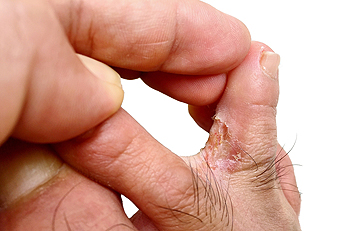 Corns will typically develop on the pinky toe or between the toes as a result of pressure and friction. A common cause of the development of this condition, is from shoes that do not fit correctly, which causes the toes to have inadequate room to move about. This painful ailment may cause pain to exist inside the toe, and this may be a result of the pressure that is exerted on sensitive nerves. Corns are divided into two categories, and are referred to as hard or soft corns. The latter will exist in between the toes and will thrive in moist environments. Hard corns typically form on the tops of the toes where that portion of the toe meets the shoe. Corns can be prevented by choosing to wear shoes that fit properly. If you are experiencing hard or soft corns, it’s advised to consult with a podiatrist who can suggest proper treatment options that are correct for you.
Corns will typically develop on the pinky toe or between the toes as a result of pressure and friction. A common cause of the development of this condition, is from shoes that do not fit correctly, which causes the toes to have inadequate room to move about. This painful ailment may cause pain to exist inside the toe, and this may be a result of the pressure that is exerted on sensitive nerves. Corns are divided into two categories, and are referred to as hard or soft corns. The latter will exist in between the toes and will thrive in moist environments. Hard corns typically form on the tops of the toes where that portion of the toe meets the shoe. Corns can be prevented by choosing to wear shoes that fit properly. If you are experiencing hard or soft corns, it’s advised to consult with a podiatrist who can suggest proper treatment options that are correct for you.
Corns can make walking very painful and should be treated immediately. If you have questions regarding your feet and ankles, contact Dr. Lubrina Bryant of District Podiatry, PLLC. Our doctor will treat your foot and ankle needs.
Corns: What Are They? And How Do You Get Rid of Them?
Corns are thickened areas on the skin that can become painful. They are caused by excessive pressure and friction on the skin. Corns press into the deeper layers of the skin and are usually round in shape.
Ways to Prevent Corns
There are many ways to get rid of painful corns such as:
Treating Corns
Although most corns slowly disappear when the friction or pressure stops, this isn’t always the case. Consult with your podiatrist to determine the best treatment option for your case of corns.
If you have any questions please feel free to contact our office located in Washington, D.C . We offer the newest diagnostic and treatment technologies for all your foot and ankle needs.